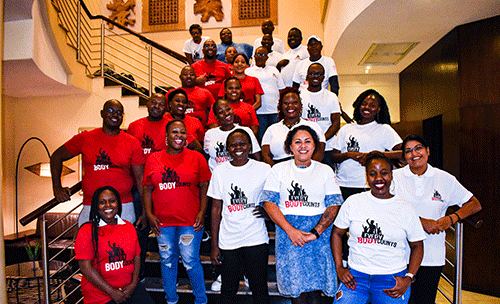JOHANNESBURG – Social justice and gender equality advocate Wilson Chivhanga said there is a gap in the levels of knowledge and understanding by journalists on the continent on bodily autonomy and integrity, something that is the cause of Sub-Saharan African media poorly reporting on it.
He told New Era during the media training on bodily autonomy and integrity, hosted by the AIDS and Rights Alliance for Southern Africa (ARASA) in Johannesburg, South Africa.
ARASA was established in 2002 as a regional partnership of civil society organisations operating in 18 countries working to promote respect for and the protection of the rights to bodily autonomy and integrity for all to reduce inequality, especially gender inequality by promoting health, and dignity and wellbeing in southern and east Africa.
The workshop hosted about 20 health journalists and community correspondents representing various media houses from Mauritius, Kenya, Malawi, South Africa, Uganda, Zambia, Mozambique, Seychelles, Zimbabwe, Botswana and Lesotho.
“Most of the journalists write from that perspective of personal opinions or how they feel about a certain issue. That is one of the big gaps. The different media houses and their editorial policies also play a role in the stories,” stated Chivhanga, who was referring to media reports on the LGBTQI+ community and stories on women’s health.
He said certain media houses are open to those conversations while one finds several others who prefer to be mum on such matters.
“You do find media houses who do discuss or address bodily autonomy and integrity issues but under certain conditions and control the narrative of such stories – and that is what we want to address with such kinds of training,” said Chivhanga.
Seychellois journalist Vidya Gappy said it is difficult for media practitioners in the Indian Oceanic Island to write about the LGBTQI+ community but they have found a way to navigate around it.
“Instead of us writing it, we tell NGOs and other stakeholders to write pieces to spread awareness and educate the public more on issues affecting the community and that goes well. Slowly, we are starting to talk about it freely. It is important to keep track of progress made on these issues, especially by us, the small island nations because you will be shocked,” insisted Gappy.
Namibian-based Zimbabwean journalist Moses Magadza says the reporting on bodily autonomy, and integrity is affected by many things: like editors who are reluctant to create space for related content, as they do not want stories to explode in their faces.
“You need to build your capacity when writing these stories factually and to do it in a manner that does not force your publication to run error term or a withdrawal because that diminishes the status of your publication.
“The editor will not give you space unless they trust they can deliver a copy that does not come back. Make sure you write articles that when submitting to your editor, require less open-heart surgery because as an editor you get these stories and because of the way a story is written, you end up interviewing the reporter,” he added.
He added one way of reporting on key populations without creating a problem is to understand who, what and how they are.
“If they prefer to be identified as ‘he’ then it is a he, and so be it; if it is a ‘she’ then she, or ‘they’ then they. Let’s get the terminologies correct,” stated Magadza.
– psiririka@nepc.com.na



